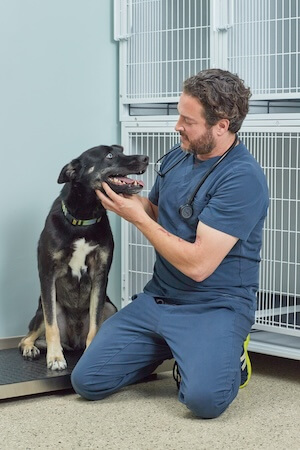
Bringing your pet to the Soft Coral Capital of the World? We’ve handled numerous pet exports to Fiji — let us help with yours.
Planning a move to Fiji with a pet is a complex, lengthy process. It involves navigating multiple timelines for vaccine, testing, and treatment requirements on top of the usual hoops around prepping a pet for international travel.
We’ve put together a guide to help you navigate pet travel to Fiji, including ways a professional pet shipper can ease the stress of relocating your pet to their new home.
Eligible Pets and Country Restrictions
Fiji is generally pet-friendly once you get there, but the island has both country- and breed-specific restrictions on pet cats and dogs. It’s important to review their pet policy regarding both before even booking your flight.
Eligible Pets
The following dog breeds are prohibited from entry to Fiji:
- Dogo Argentino
- Fila Brasileiro
- Japanese tosa
- Pit bull terriers, including American pit bull terriers
- Mixed or cross-breeds of any of the above
Fiji also bans serval cats and any mixed or cross-breeds of serval cats within 5 generations of the original serval cat. This includes Savannah cats, a hybrid cross of a serval cat and a domestic cat.
All pets should be at least 16 weeks old on their travel date. Pets should be no more than 21 days pregnant during export.
It’s important to note that this information does not include additional breed restrictions set by the airlines. These may consist of bans on snub-nosed breeds that come with an added health risk during travel.
While airlines may allow the transport of live animals and domestic pets other than cats and dogs, Fiji pet import and animal transportation rules are limited to cats and dogs only.
Approved Countries
The Biosecurity Authority of Fiji (BAF) sets import requirements based on the pet’s origin point and that country’s rabies risk. For import rules to apply, pets should spend at least 6 months of uninterrupted time at an approved origin point.
Fiji only allows the import of cats and dogs from approved countries and territories. Group A countries are rabies-free countries and territories like Australia, French Polynesia, Vanuatu, and New Zealand. Group B countries are countries and regions with a lower rabies risk.
This includes the United States and most European countries. Hawaii and Guam, two rabies-free origin points, still fall under Group B as territories of the United States.
Pets not coming from a country on either list are not eligible for direct import into Fiji. The only way around this is to move your pet to an approved country or territory for at least 6 months before their pet moving date.
You may also submit a request for inclusion of a home country or territory not on either list to the BAF, although this process will likely take even longer than 6 months.
Microchip and Vaccinations
Fiji is a rabies-free destination country with strict requirements around identification and rabies vaccination.
Microchip
Cats and dogs should have an ISO-compliant microchip implanted before their rabies vaccinations. Microchips should be easily readable by ISO-compatible readers prior to pet shipping. Your vet can help make sure this is the case for your pet.
Vaccinations
All cats and dogs entering Fiji from a Group B country need to be vaccinated against rabies at least 30 days before their travel date. Rabies vaccinations should remain valid until your pet is released from mandatory quarantine.
Dogs must also be vaccinated against canine distemper, canine adenovirus type 2 (canine infectious hepatitis), parvovirus, and parainfluenza virus. This comes as a single vaccine called DHPP (or DA2PP).
Cats must also be vaccinated against feline viral rhinotracheitis (feline herpes), calicivirus, and feline panleukopenia (feline distemper). This comes as a single vaccine called FVRCP.
Cats and dogs should receive their combo vaccines at least 30 days and no more than 12 months before travel to Fiji. Vaccination certificates or copies for all relevant vaccines should be endorsed by a USDA-accredited vet. Your vet may have additional recommendations for vaccines depending on your pet’s health history and the fact that most pets will have a lengthy post-entry quarantine.

Blood Tests and Treatments
Cats and dogs coming to Fiji from a Group B country need to arrange for a Rabies Neutralising Antibody Titre Test (RNATT) or Fluorescent Antibody Virus Neutralization (FAVN) test. Both check whether your pet is sufficiently protected against rabies.
Blood tests should be done at least 180 days and no more than 365 days before your pet’s travel date by a government-approved testing lab. Tests should be done at least 4 weeks after vaccination to allow for sufficient antibodies and a positive result. The results of your pet’s titer must be greater than or equal to 0.5 IU/ml.The date your pet gets their blood draw will determine how long they have to quarantine when they get to Fiji. (We’ll detail this when we get to Fiji’s quarantine requirements.)
Dogs entering Fiji need these additional tests:
- Ehrlichia canis (Ehrlichiosis): Dogs must be tested for this tick-borne infection by an indirect fluorescent antibody test within 45 days before travel to Fiji. They should also receive treatment with a long-acting acaricide (a pesticide) within 24 hours of that test.
- Leptospirosis: Dogs must be tested for infection by a serum agglutination test within 30 days before travel to Fiji. If they don’t get a negative result (most dogs vaccinated for leptospirosis won’t), they’ll need a follow-up test 14 days from that initial test and within 16 days of their travel date.
- Brucellosis: Dogs must be tested for Brucella canis, a contagious bacterial infection, within 30 days before travel to Fiji.
All pets must be treated against both external and internal parasites before they arrive in Fiji:
- Echinococcus granulosus: Dogs need 2 separate fecal tests at least 6 weeks apart that show a negative result for Echinococcus granulosus (tapeworm) eggs. The first test and treatment should be within 49 days of travel. The second test and treatment should happen within 4 days of travel.
- Echinococcus multilocularis: Cats need 2 separate tests at least 4 weeks apart that show a negative result for Echinococcus multilocularis (tapeworm) eggs. The first test and treatment should be within 35 days of travel. The second test and treatment should happen within 4 days of travel.
- Deworming treatment: All pets must be treated with an anthelmintic, or dewormer, for internal parasites like roundworm and hookworm within 4 days of their travel date.
- External parasites: All pets must be treated with an insecticidal dip or spray targeting ticks, lice, and fleas within 4 days of travel to Fiji.
All pets should be examined by a registered vet 48 hours before travel and found free of any signs of infectious or contagious diseases and external parasites. That vet should also give final approval as to whether your pet is healthy enough to fly in air cargo.
Assume all tests and treatments should be endorsed by a USDA-accredited vet and included as part of your pet’s veterinary certificates (specifically Veterinary Certificate A). Dates, dosages, and microchip information should match across all documents.
Fiji’s testing and treatment requirements are the most cumbersome piece of the process. Pet transportation services and professional pet shippers can dramatically reduce the stress of meeting strict timelines and testing requirements for the most efficient move possible.
Need support shipping your pet within the U.S.? We can help
Import Documents
Pets traveling from Group A or Group B must apply for import permits issued by the BAF. These are available from the BAF by email. The BAF reports that it takes them about 5 working days to process applications for import permits.
Import permits are valid for 6 months from the date they’re issued. This leaves a tight window for travel as you navigate timelines for the various vaccination, testing, and treatment requirements.
In addition to import permits, the BAF requires a health certificate, veterinary certificates A and B, and copies of all vaccination certificates, blood tests, and treatments. Every page of Veterinary Certificate A, any lab reports, and vaccine certificates must be stamped and endorsed by a USDA-accredited vet.


Airline Options
The airline you choose for transporting your pet to Fiji may have additional requirements for you to meet before your travel day. That may include crate or kennel requirements, health certificates, and breed-specific requirements.
Our preferred partner is Fiji Airways. They offer nonstop flights from several U.S. cities to Nadi International Airport (NAN), with flights from Los Angeles daily. This route is ideal for travelers who need accommodations for weekend flights.
All pets flying to Fiji on that airline do so as cargo. Flying pets in cargo is safe and often the most efficient way to get pets to their destination, as well as through customs clearance.
Quarantine
The BAF operates quarantine facilities in Koronivia, Nausori, near NAN. Pets coming from Group A countries are required to complete a 7-day stay. Pets from Group B countries are required to complete a minimum 30-day stay as long as their rabies titer blood draw happens 180 days or more before arrival in Fiji.
Otherwise, follow the timeline below for titer tests given below that threshold:
- 135 days before arrival in Fiji: 45-day quarantine
- 135 days before arrival in Fiji: 60-day quarantine
- 120 days before arrival in Fiji: 90-day quarantine
- 65 days before arrival in Fiji: 115-day quarantine
Pet owners should contact the quarantine facility at least 6-8 weeks before their departure to ensure space for their cat or dog.
Official assistance or service dogs are the only pets potentially exempt from quarantine, but they must meet all other requirements. This does not include emotional support animals. Approval for service dogs comes from the BAF.
How Tailwind Can Help
At Tailwind, we’ve successfully worked with pet owners on the most complex itineraries to ensure every logistical piece is handled before their pet’s travel day. If this guide left you feeling worried about missing something before a move to Fiji, we can ease those concerns.
We’re here for our clients 24/7, especially for those traveling to and from destinations that require extra legwork.

Ready to get started? EachReady to get started? Each situation is a little different, so contact us to get an idea of the costs involved.
See What Our Clients Have to Say

“It was a real pleasure working with Brady from TailWind Global Pet. He provided all the information we needed and answered our queries promptly and professionally. He even took the time to do a Zoom call with us to talk through the process and reassure us that Milo would be well taken care of during his overnight stay in LAX. It was a long flight from the UK to Fiji, so an overnight stay was really helpful for Milo and gave us a peace of mind. He sent us photos during his stay and kept us updated when he arrived. There were no issues with his flight and airway bill or documents on arrival into Fiji. Thank you Brady for being so patient and understanding with us during our relocation to Fiji, bringing Milo over was the final stage of our move. We highly recommend TailWind Global Pet and Brady for relocating pets worldwide.”
– Leonora Sinclair
